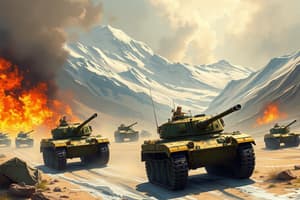Podcast
Questions and Answers
Why was Pakistan formed in 1947?
Why was Pakistan formed in 1947?
- To unite with India and become one nation
- To create a country for Hindu landowners
- To gain independence from British rule
- To provide a homeland for Muslims based on the Two Nation Theory (correct)
What were some of the challenges faced during the formation of Pakistan?
What were some of the challenges faced during the formation of Pakistan?
- Peaceful negotiations and agreements
- Riots between Hindus and Muslims, massacres, and forced migrations (correct)
- Mass population migration from Bangladesh to Pakistan
- No significant challenges were faced
Which regions made up the initial two parts of Pakistan in 1947?
Which regions made up the initial two parts of Pakistan in 1947?
- Northern Pakistan and Eastern Pakistan
- North Pakistan and South Pakistan
- Central Pakistan and Coastal Pakistan
- East Pakistan and West Pakistan (correct)
What theory was advocated by Muhammad Ali Jinnah as the basis for the creation of Pakistan?
What theory was advocated by Muhammad Ali Jinnah as the basis for the creation of Pakistan?
Which event marked the escalation of conflicts between India and Pakistan after gaining independence?
Which event marked the escalation of conflicts between India and Pakistan after gaining independence?
What demonstrated the resilience of the new nation of Pakistan during its formation in 1947?
What demonstrated the resilience of the new nation of Pakistan during its formation in 1947?
Who declared martial law and suspended the constitution in Pakistan in 1958?
Who declared martial law and suspended the constitution in Pakistan in 1958?
What was the name of Pakistan's aspirational first constitution adopted in 1956?
What was the name of Pakistan's aspirational first constitution adopted in 1956?
Which war broke out when Pakistani troops marched into Jammu & Kashmir in October 1947?
Which war broke out when Pakistani troops marched into Jammu & Kashmir in October 1947?
Who came to prominence in the late 1960s and eventually led Pakistan to become a republic?
Who came to prominence in the late 1960s and eventually led Pakistan to become a republic?
Which military intervention played a crucial role in shaping Pakistan's political landscape?
Which military intervention played a crucial role in shaping Pakistan's political landscape?
When did Pakistan make progress towards an independent legal system by adopting its first constitution?
When did Pakistan make progress towards an independent legal system by adopting its first constitution?
Flashcards are hidden until you start studying
Study Notes
History of Pakistan from 1947 to 1969: From Formation to Wars and Constitutional Change
On August 15th, 1947, just months after India became independent from British rule, the State of Pakistan was formed. It was initially divided into two parts separated by more than 1,000 miles—East Pakistan (which later became Bangladesh) and West Pakistan. This region represented areas with significant Muslim populations, which had been ruled by the British Raj since the mid-nineteenth century. In total, it consisted of over half a billion people across the Indian Subcontinent, making it one of the most populous regions ever to experience decolonization.
Formation of Pakistan
The partition of India along religious lines led to the creation of Pakistan, a homeland for Muslims based on the Two Nation Theory advocated by Muhammad Ali Jinnah. However, the process of formation was tumultuous, marked by riots between Hindus and Muslims, massacres, and forced migrations. Overnight, millions of Hindu landowners lost their property, and hundreds of thousands of Muslim families were displaced. Violence erupted throughout the Punjab, Bengal, Bihar, and elsewhere. By enduring these trials during Partition, the new nation Pakistan demonstrated its resilience.
Indo-Pakistan Wars
After gaining independence, tensions between India and Pakistan escalated quickly into conflicts known as the Indo-Pakistani War:
-
First Kashmir war (also called the Indo-Pakistani War of 1947–48), where hostilities broke out when Pakistani troops marched into Jammu & Kashmir in October 1947.
-
Second Kashmir war (or Operation Grand Slam), launched by Pakistan in January 1965.
These conflicts stemmed from disagreements over control of the disputed territory of Kashmir, resulting in multiple military confrontations and nuclear threats.
The Constitution of Pakistan
In terms of constitutional development, despite inheriting a constitution drafted during colonial times, Pakistan made progress towards an independent legal system. Its aspirational first constitution was adopted in 1956—the Objectives Resolution—following General Ayub Khan's coup d'état on October 7, 1958. Afterward, several constitutions followed, each reflecting changing political circumstances and leadership changes within the country.
Political Landscape
Politically, Pakistan underwent various stages. Initially, the country operated under a parliamentary system until Field Marshal Mohammad Ayub Khan took power through a bloodless coup in 1958. He declared martial law and suspended the constitution. By the late 1960s, Prime Minister Zulfikar Ali Bhutto came to prominence, eventually leading the country to become a republic and establishing a presidential form of government. Throughout this period, military interventions played a crucial role in shaping the political landscape of Pakistan.
Despite facing numerous challenges including Partition violence, ongoing conflict with neighboring India over territories like Jammu and Kashmir, and internal struggles over governance structures and democratic processes, Pakistan continued to evolve politically and socioeconomically. These developments set the stage for further change and growth in the decades ahead.
Studying That Suits You
Use AI to generate personalized quizzes and flashcards to suit your learning preferences.




